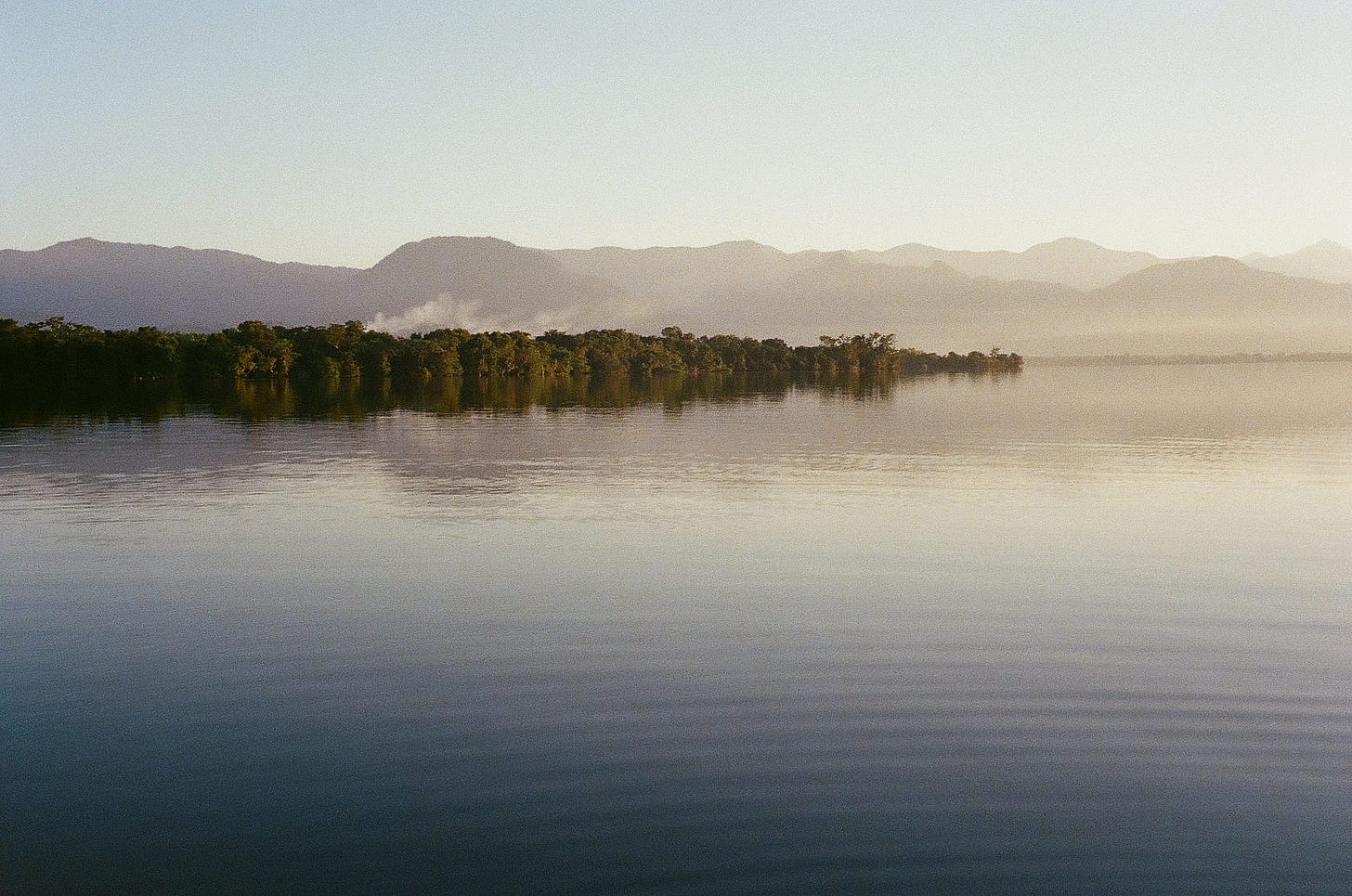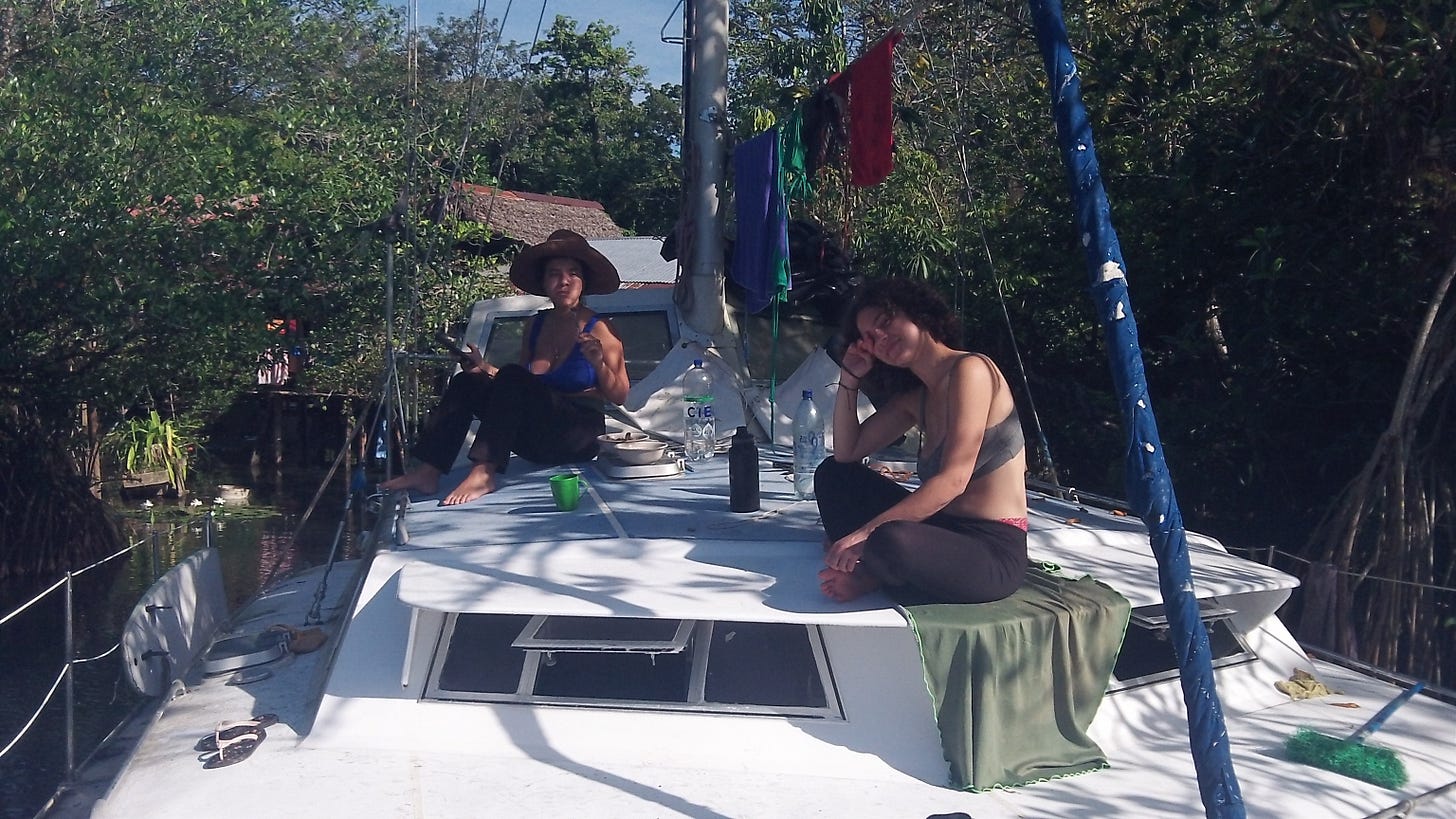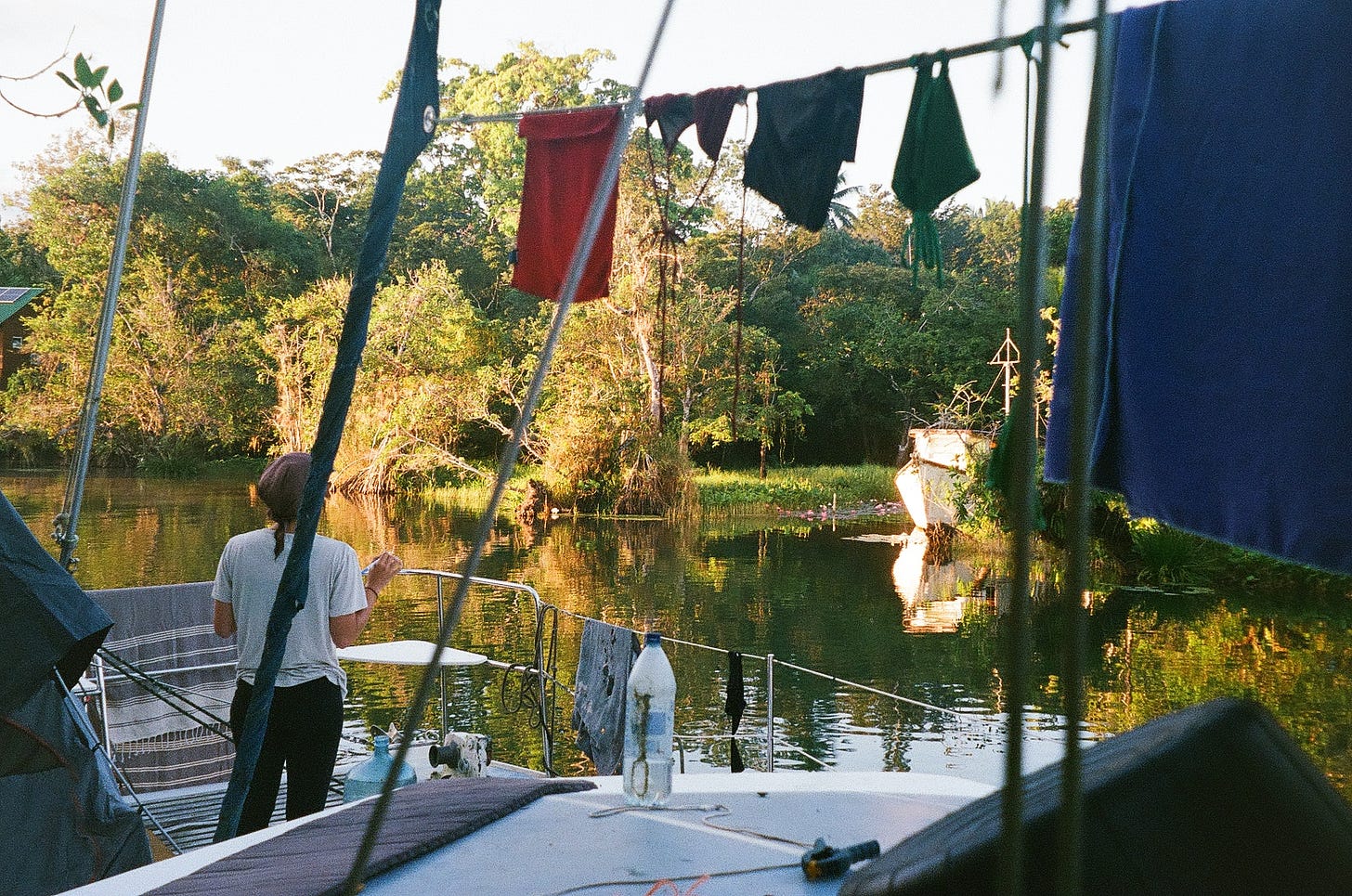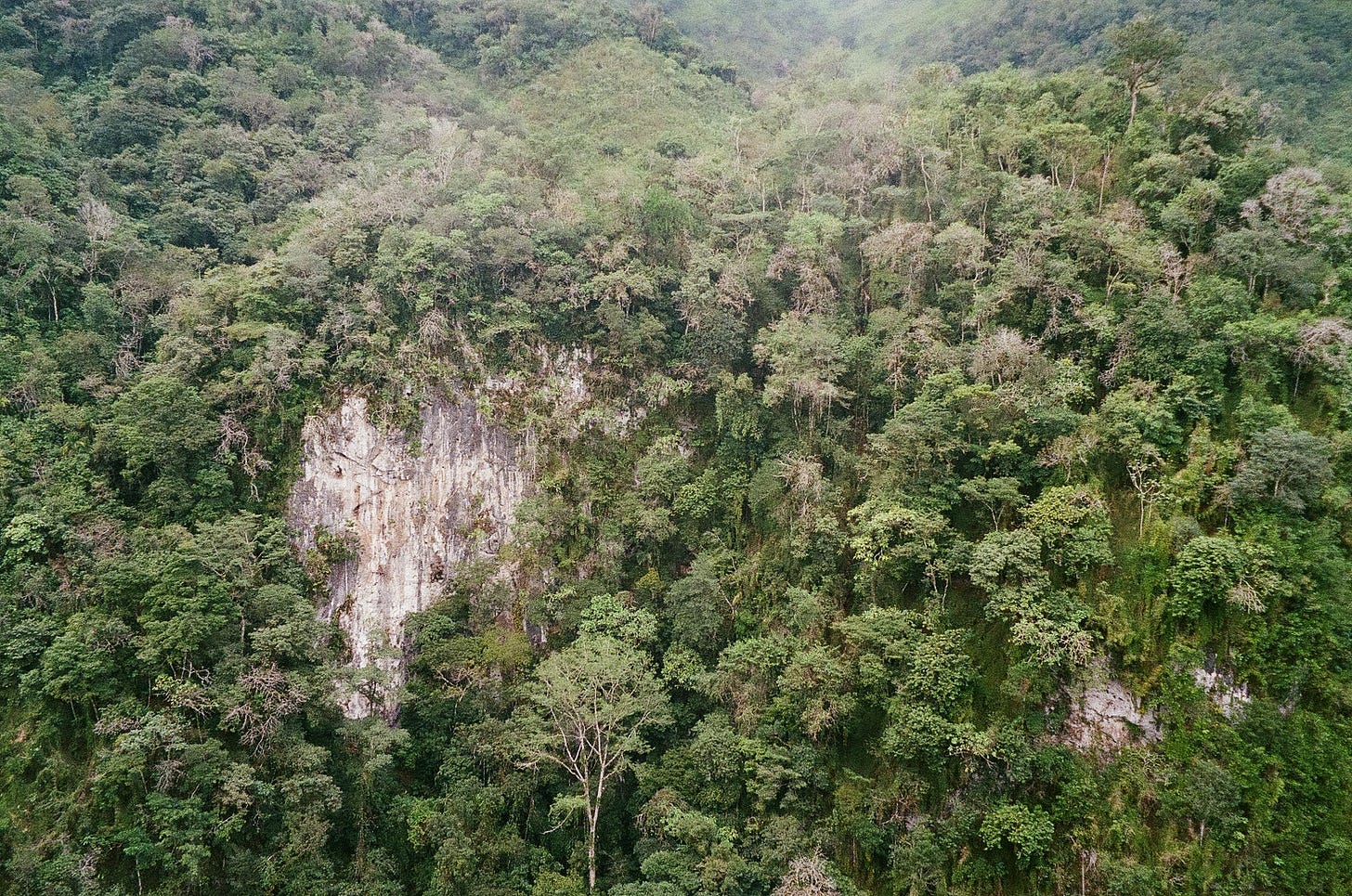the anchorage from hell and other dangerous decisions
learning to sail the hard way | seastray II
I felt real fear only three times in those four months. The first time I felt fear, the moon was full, and the feeling lasted no more than a minute. We were anchored in a deep-reaching inlet, surrounded by jungle vibrating with the constant call of howler monkeys, in a remote corner of Guatemala’s Lake Izabal when a lancha (motorboat) full of eight armed figures silhouetted in the moonlight approached out of dense darkness. We knew of the area only that it offered great opportunity to birdwatch by kayak in the cool marshes that branch off around the perimeter and also that Narcos operated in the ancient Mayan temple back beyond the biosphere reserve and the palm plantation that billowed gray fumes up into the towering mountain range across the inlet.
February was nearing its end, and Daeli had been teaching us to sail in the lake for just a week, but nearly a full moon cycle had run its course since I arrived on the catamaran for the first time. The events that led us to that fearful night in the lake began when, barely an hour before dark, I first found Friend Ship lodged in the shallow of a small cove near the city where a Guatemalan family cast a net from their canoe and three small boys bathed nude in the pooling tide out front of their stilted home. I shared this moment with two women whom I would come to consider dear friends; I had met Josephine in the room cramped with sixteen bunks in the hostel in the colonial city of Antigua a week prior and Yelena in the Río Dulce market where I found her ripping the leaves from the crowns of pineapples to test their ripeness only just before we boarded the lancha with our big backpacks.
the mold, the mess, the hydraulic cylinder piece
Immediately upon removing the torn sheet of tarp that served in vain to shield the cabin of the abandoned boat from the rogue outdoors, we were accosted with the stench of mold erupting from the moist enclosure, burning our noses, salivating in our mouths, and making our heads feel faint and achy. We sifted through torn mattresses and wads of rope and assorted knickknacks with our shirts pulled up over our noses until, just after the sun set with headlamps illuminating our way, we assembled on deck the tent we found under planks of wood in a dusty corner of the cabin. It was missing pieces and slightly torn, and the pole was split in the middle, so in the end, it stood half on its own and half leaning clamped against the railings that border the deck. We draped the corner of a sail across the top of our leaky tent, and a floating fort emerged, much like the sort of shelter children might piece together on a living room floor, except not, because we were three women–strangers as of yet–constructing not for amusement so much as necessity, to provide defense against swampy surroundings and the temperamental clouds sulking in blackness above.
The coming days combined into a collage of sickening chores and shameful adjustments to a lifestyle stripped of luxury. That meant kayaking out to the middle of the lake to bathe in water less exposed to the city’s toxic run-off and to fill buckets for dirty dishes waiting on the boat to be rinsed. It also meant relieving ourselves in the buggy mangroves or otherwise off the back of the boat after dark so as not to offend the neighbors. We spent the majority of our waking hours scrubbing dirt from the deck and mold from the cabin, both putrid and layered after half a year of neglect, left defenseless against encroaching tropics. We noticed, too, in the evening time that we were in the company of a mild cockroach infestation.
When we completed the initial decontamination, tasks evolved to incorporate things organizational, resourceful, and mechanical. Josephine fronted the crisis in the kitchen, sorting and tossing various goodies like rusty cans of expired tomato puree and dry rice plagued by mites. Aside from making massive headway in killing the invading fungus by wiping white vinegar on the black corroded ceiling, walls, and floor, Yelena led town missions assigned to us by our absent captain–at that point known only as a faceless voice echoing vague instructions and impractical ideas from the speaker of a smartphone. Daeli directed us from afar as though each errand were a mysterious quest, giving us the names of people to ask for in the tiendas in town who might be interested in buying our broken battery and explaining how to find the taller where we could purchase a solar inverter based on the location of the man who sews shoes on the curb. While Yelena worked out where to buy anti-oxidation fluid and machine oil for half the market price, I pondered what to do with the large piece of mechanical equipment I had stuffed in my duffle bag between old clothes, camera gear, and cash hidden in various inconspicuous containers.
Daeli shipped the hydraulic cylinder piece to my home address before I left because apparently the acquisition of miscellaneous marine products is streamlined in the United States. A man, the only crew besides Daeli with any sailing experience, came and left in the span of that first week. During his brief stay, he helped me install the cylinder to the tiller arm–which we found in a state of precarious decay–and the hydraulic hoses that pump pressurized liquid from the motion of the steering wheel, trading with me tools and interpretations of the manual, as I sat curled in the compartment flooded with oil at the back of the boat.
All this might sound unappealing, but at the same time, the morning fog fell such that the sun shone in thick beams of milky air, and everything outside our boat lent itself a shade of green in the light–the water a muddy green, the lily pads fluorescent, the foliage a sweet array of saturations. The only exceptions were the pink petals of the lilies and the stark white feathers of the heron that stood each day for an hour after dawn on the small wooden dock across the way, watching fish gather in the water around the wreckage of an aluminum vessel that now sprouted weeds and invited ivy to populate its surface of peeling paint. And anyways, several lanchas came a couple days later to transfer us to a marina where we waited for the rest of the crew and a local man worked to fill the leaks in all the windows and below some of the deck fittings with fiberglass, the residue of which made us itch on board and infiltrated the hammock that I hung from the mast to the boom to sleep at night. The work was never completed because, when Daeli arrived midday on the following Friday, he wasted less than an hour before he had us swapping Genoas (the large jibsail at the front of the boat) and pushing Friend Ship off the dock, the carpenter’s tools left out on his workbench by the boathouse with a message to let him know we would be back in town in a week or two to pick up his special mix of anti-slip paint and to pay the rest of the money we owed him.
That is how we ended up cornered in the lake that night by the men with the guns in the motorboat. We only knew about the cartel base because Daeli told us how, with a previous crew, he had been briefly captured and interrogated on Narcos soil after embarking on an overnight expedition through the untouched jungle, slicing with a machete his path through dense vegetation, to find a spring that he saw on a map on the other side of the ridge. Fear framed by Daeli’s anecdote dissipated when the boat neared enough for us to make out the matching camouflage uniforms and velcro badges signifying status of official national defense. The long sail to the base of the inlet where we sat anchored–protected from the elements but vulnerable to unwanted visitors–had proved our most challenging thus far with fierce and volatile winds, rapid consecutive tacks, and the first taste of the intensity that comes with real speed in an environment unforgiving of error. So we were very tired and extra relieved when the men turned out to be military. They asked Daeli some questions in Spanish and then advised us to avoid the other side of the inlet. When they finished inspecting each of our passports and sent warm wishes on their way, we wondered aloud whether their responsibilities involved protecting us from the illegal drug trafficking hub or the other way around.
The second time I felt fear, I was eating ice cream in Belize on Easter Sunday. I had only just sat down on a washed-up log by the coast to enjoy the sounds of a city in celebration when I looked up to see Utopie in the shallows.
Thanks for reading! This piece was originally published under the title “About a Sea Stray” in Volume II of Duvu Magazine, a women’s arts and culture publication based in Philadelphia, PA. Find them on instagram and purchase a copy to see this essay in its physical spread.
This is the second installment of a five part essay. Read part one, part three, part four, and part five on my Substack!





